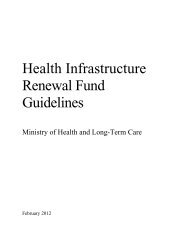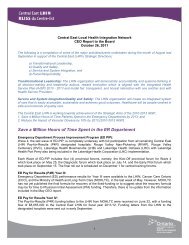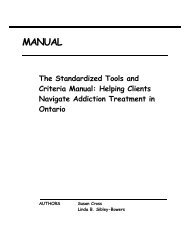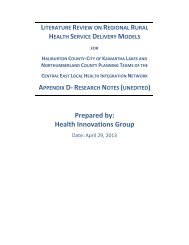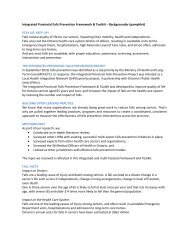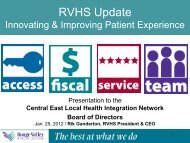CDE Appendix 1 Literature Review - Central East Local Health ...
CDE Appendix 1 Literature Review - Central East Local Health ...
CDE Appendix 1 Literature Review - Central East Local Health ...
You also want an ePaper? Increase the reach of your titles
YUMPU automatically turns print PDFs into web optimized ePapers that Google loves.
The Culture, Diversity and Equity Project: <strong>Literature</strong> <strong>Review</strong><br />
Box 4.2 continued<br />
The Equality Delivery Assurance Group (EDAG) functions as an advisory body, whose responsibility is to coordinate and<br />
provide assurance on compliance with equality legislation and other policy aspects of the DH Single Equality Programme. 29<br />
The Policy Committee (of the Departmental Management Board) is responsible for “monitoring the SES action plan and the<br />
continued application of equality screening and equality impact assessments across the DH policy delivery” (DH 2007b). The<br />
Committee receives quarterly reports from the EDAG on progress against the SES action plan and the programme of policy<br />
equality screening. The Policy Committee also contributes to the Annual Report of the Departmental Management Board.<br />
Role of Strategic <strong>Health</strong> Authorities in equalities planning and monitoring<br />
Strategic <strong>Health</strong> Authorities (SHAs) also play a critical role in ensuring that they and the local health providers and purchasers<br />
that they monitor and oversee fulfill their legal and policy obligations in relation to equality issues. As part of their management<br />
function, Strategic <strong>Health</strong> Authorities each produce their own three-year Single Equality Schemes (SES) which set out their<br />
commitment to promoting equality of opportunity and tackling discrimination in access to health services and in the way that staff<br />
are treated (NHS London 2007).<br />
NHS London has developed and is currently implementing its own SES (2007-2010), which has a total of 37 objectives. Each<br />
objective is broken down into various associated ‘Tasks’, each of which are assigned a Lead person, Target Date for completion,<br />
and Outcome Measure(s).The NHS London Board 30 is ultimately accountable and responsible for successful implementation of<br />
the scheme. The Chief Executive of the Board and named Leads are responsible for reporting on progress and ensuring that<br />
action plan objectives are being met within their areas of responsibility.<br />
The development of NHS London’s (2007-2010) SES was facilitated by the Equality Steering Group (ESG), which is made up<br />
of a cross-section of NHS London staff (including senior representatives from Public <strong>Health</strong>, Corporate Affairs, Human<br />
Resources, Communications, the Union, and the Research unit). The Equality Steering Group’s purpose is “[t]o manage the<br />
overall project to produce the Strategic <strong>Health</strong> Authority’s Single Equality Scheme consultation document, consult on the<br />
scheme, and all related activities associated with producing the Single Equality Scheme” (NHS London 2007).<br />
NHS London’s Single Equality Scheme (2007-2010) was also developed through the involvement of an Equality Reference<br />
Group (ERG). The purpose of the ERG was “[t]o actively participate in determining the scope, content, and presentation of the<br />
Strategic <strong>Health</strong> Authority’s Single Equality Scheme consultation document, and to actively participate in determining the scope<br />
and methodology for the consultation process” (NHS London 2007). In addition to including disabled people within the group,<br />
other equality strands were also represented within the ERG group membership.<br />
While all of the monitoring functions described above, in the case of the Department of <strong>Health</strong> and the Strategic <strong>Health</strong><br />
Authorities, are internal to these organisations, UK equalities legislation also grants “significant powers” to the Equality and<br />
Human Rights Commission 31 to “enforce the equalities duties of organisations and authorities, including, ultimately, launching<br />
official inquiries and formal investigations” (Retrieved January 24, 2009 from http://www.equalityhumanrights.com).<br />
4.3. PERFORMANCE MANAGEMENT LEVERS<br />
One of the most critical means of ensuring accountability for and compliance with health equity policy and strategy<br />
is by embedding and monitoring health equity goals and outcomes in performance management systems. Among the<br />
29 The DH Single Equality Programme incorporates the Single Equality Scheme and SES action plan development and monitoring, the Equality<br />
Impact Assessment Programme (EIA), Equality Delivery Assurance Group secretariat and Stakeholder <strong>Review</strong> and Management (for more on the<br />
Single Equality Programme see http://www.dh.gov.uk/en/Managingyourorganisation/Equalityandhumanrights/index.htm).<br />
30 NHS London is governed by the NHS London Board, which is made up of 6 non-executive directors (including the Chair), 5 executive<br />
directors (including the Chief Executive), and 4 non-voting members. The board is responsible for:<br />
establishing values and standards for NHS London<br />
agreeing the strategy for the NHS in London<br />
monitoring our performance against financial and other targets<br />
ensuring that risk is well managed (Retrieved March 3, 2009 from http://www.london.nhs.uk/who-we-are/people-and-structure/ourboard.)<br />
31 The Equality and Human Rights Commission is a non-departmental public body (NDPB) established under the Equality Act 2006 –<br />
accountable for its public funds, but independent of government.<br />
83



